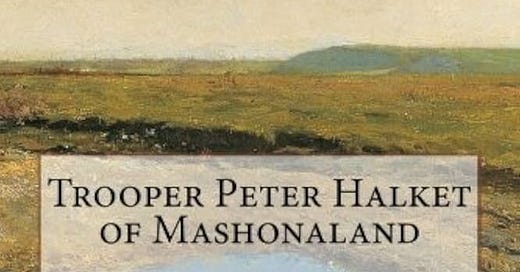The book Trooper Peter Halket of Mashonaland by Olive Schreiner is a fascinating example of Christian British anti-imperial literature from the late 19th and early 20th century.
It is a novella that explores the themes of colonialism, violence, racism, greed, and moral conflict during the Second Matabele War 1896-97 in Southern Africa, i.e., modern-day Zimbabwe.
Note, the language is historical but not sanitized for 2020s consumption. There’s a lot of “N” and “K” words, so keep that in mind.
The story centres on trooper Peter Halket, who is a young soldier in the British army. Halket is both idealistic about the empire, yet naive about the realities of colonialism and the brutalities of counter-insurgency warfare. He enlists in the colonial army from England to make his money in South Africa so he can return to England like Cecil Rhodes and bath himself in wealth.
However, during operations against the Matabele people, Halket goes on a reconnaissance mission but gets lost and has to bunker down for the night around a fire. Then comes a pivotal when he encounters a mysterious stranger in the night, who shares insights about the suffering of the Matabele people, tells him various parabolic anecdotes about standing up for what is right, and exposes his Halket’s own greed. The implied reader grasps that the stranger is Jesus and Halket says that the man’s values remind him of his own mother’s! This conversation profoundly impacts Halket, forcing him to reflect on his beliefs and the injustices of the colonial war. The stranger calls on Halket to go back to England and tell the nation about the evils of land-theft, violence, and the forced-labour imposed on the natives.
In the end, Halket returns to his military camp, and tries to set free a captured native who is suspected of being a spy. When Halket’s pleas are rejected, he frees the man from certain death during the night but is shot in the process.
This is a short read, only 40+ pages, and it is a very good example of how many British Christians were deeply uncomfortable with the moral fabric of their own empire and its pernicious deeds.




